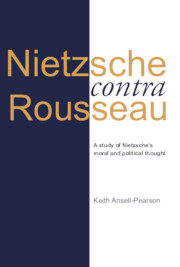Book contents
- Frontmatter
- Contents
- Preface
- Note on the texts and list of abbreviations
- Introduction
- 1 Nietzsche contra Rousseau
- 2 Civilization and its discontents: Rousseau on man's natural goodness
- 3 Squaring the circle: Rousseau on the General Will
- 4 Nietzsche's Dionysian drama on the destiny of the soul: on the ‘Genealogy of Morals’
- 5 Zarathustra's descent: on a teaching of redemption
- 6 Bending the bow: great politics, or, the problem of the legislator
- Conclusion
- Notes
- Bibliography
- Index
3 - Squaring the circle: Rousseau on the General Will
Published online by Cambridge University Press: 03 May 2011
- Frontmatter
- Contents
- Preface
- Note on the texts and list of abbreviations
- Introduction
- 1 Nietzsche contra Rousseau
- 2 Civilization and its discontents: Rousseau on man's natural goodness
- 3 Squaring the circle: Rousseau on the General Will
- 4 Nietzsche's Dionysian drama on the destiny of the soul: on the ‘Genealogy of Morals’
- 5 Zarathustra's descent: on a teaching of redemption
- 6 Bending the bow: great politics, or, the problem of the legislator
- Conclusion
- Notes
- Bibliography
- Index
Summary
Putting law over men is a problem in politics comparable to that of squaring the circle in geometry.
Rousseau, The Government of Poland (1771–2)ON THE ‘SOCIAL CONTRACT’
The opening lines of the first chapter of Rousseau's Du Contrat social can fairly be described as the motto which has inspired most the modern revolutionary spirit. ‘Man is born free’, Rousseau writes, ‘and everywhere he is in chains’. In this work Rousseau is less concerned with the origins of man's social slavery, than with how the social bond can be made legitimate. The idea that the famous opening sentence of the first chapter of the book advocates a return to nature is part of Rousseauian mythology. In fact, it is Rousseau's aim to show in what way the social bond can lay claim to a legitimate hold on men's hearts. The work is an inquiry into the principles of political right. In other words, Rousseau's concern is not so much with studying existing governments and social practices, but more importantly with examining the foundations of legitimate government and showing the legitimate basis of political obligation. Rousseau's investigation into the principles of political right is one which leads him to ask what form of government, and what type of society, would bring about not the rule of corruption, but that of virtue. The work is premised, therefore, on Rousseau's belief in man's natural goodness; without this belief such an inquiry would neither be possible nor worthwhile.
- Type
- Chapter
- Information
- Nietzsche contra RousseauA Study of Nietzsche's Moral and Political Thought, pp. 78 - 101Publisher: Cambridge University PressPrint publication year: 1991



